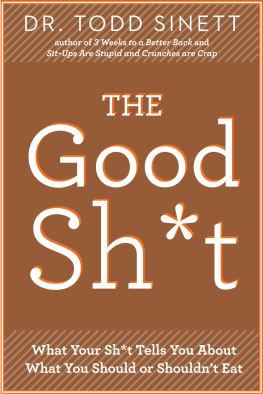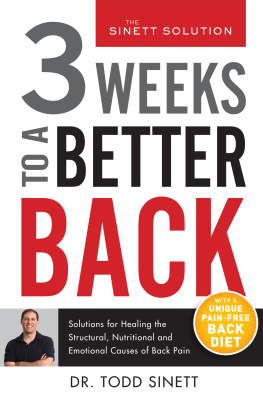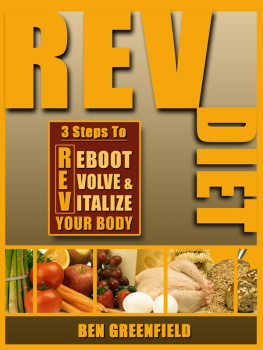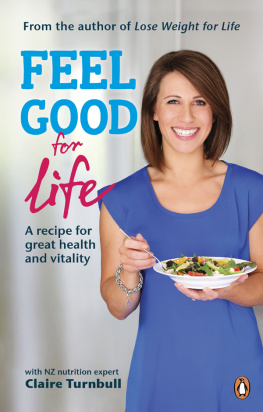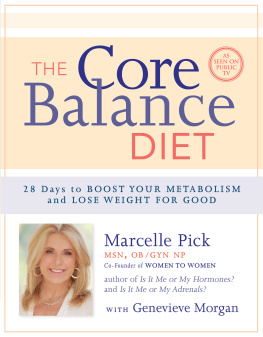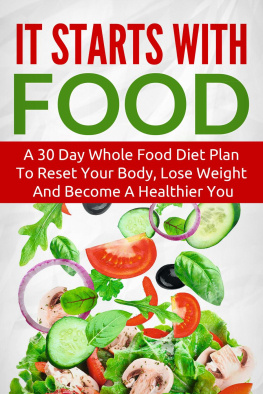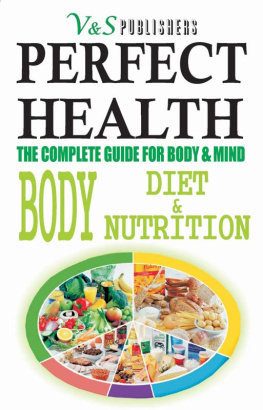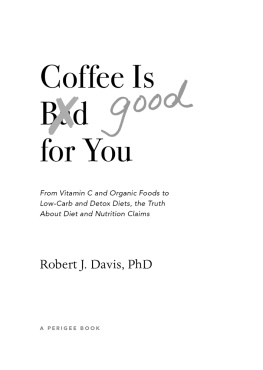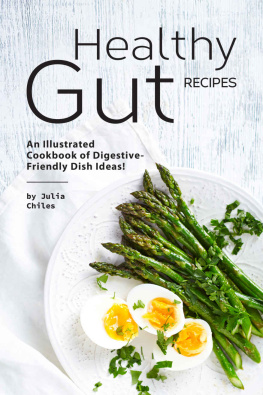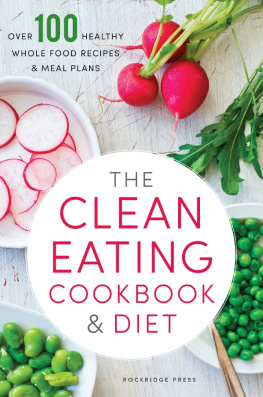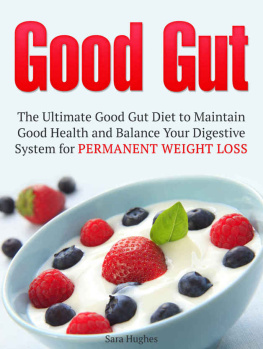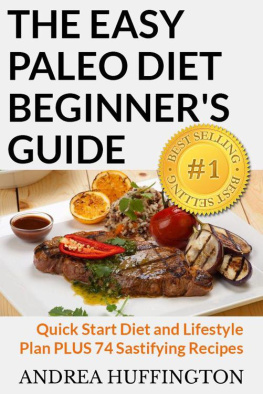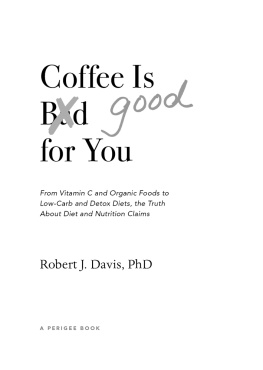
PRAISE FOR
THE GOOD SH*T
You are the person who is most in touch with your own body. You need to take onus for your own life and be responsible for yourself. Dr. Sinett is helping people everywhere understand the signs of their bodies and the importance of their poop to help increase the prevention and early detection of colorectal cancer, the number two cause of cancer death in both sexes. Life is precious. Read this book and start paying attention to the vital information the toilet is telling you.
DR. JOHN PROCACCINO, MD, FACS, FASCRS,
Director of Colon and Rectal Services for Central Region,
Chief of Colon and Rectal Surgery for North Shore Hospital,
Director of Colorectal Fellowship
As dietitians, we are often focused on what youre putting in your body, but what comes out can be a sign about what you should and shouldnt be eating. Dr. Sinetts book is a needed reminder that your digestive system is like your fingerprint, specific to you, and the newest fad diet may not work with your microbiome. The Good Sh*t can help you lose weight and feel great by achieving your own optimal gut health.
DEBORAH MALKOFF-COHEN,
MS, RD, CDN, CDE
Dr. Sinett takes a holistic approach to understanding how our gastrointestinal issues may be related to the food we eat and the way we feel from head to toe. This book clears up the messages our own bodies are sending and gives us the tools we need to normalize our own digestive systems!
DR. ALEXANDRA KREPS, MD,
Tru Whole Care and Mount Sinai
The form, character, and frequency of ones bowel movements are important clues to intestinal health. When evaluating patients, I routinely question them about their bowel habits in order to determine the most appropriate diagnostic and treatment plan. Dr. Sinetts book allows you at home to analyze your own bowel movements and make important realizations about your own health! The Good Sh*t will likely lead many to get a colonoscopy and could prevent colon cancer in many readers!
DR. KEN MILLER,
MD, Gastroenterologist,
Clinical Instructor, Mount Sinai Hospital
Finally, a common sense approach to diets! There is nothing more confusing than hearing conflicting Eat this, not that! advice. Biochemically, we are all different, and Dr. Sinett shows how your diet should be unique to you. Dr. Sinett explains it all here in easily digestible terms and makes a potentially shitty topic actually fun and attainable!
LANA BUTNER, N.D., L.Ac

THE GOOD SHIT:
What Your Sh*t Tells You About
What You Should or Shouldnt Eat
Copyright 2020 by Todd Sinett
All rights reserved. No portion of this book may be reproduced, distributed, or transmitted in any form or by any means, electronic or mechanical, including photocopying, recording, or information storage or retrieval system, without the prior written permission of the publisher.
Published by
EAST END PRESS
Bridgehampton, NY
ISBN: 978-1-7324912-9-8
Ebook ISBN: 978-1-7345268-0-6
First Edition
Book Design by Neuwirth & Associates
Cover Design by Neuwirth & Associates
Manufactured in the United States of America
10 9 8 7 6 5 4 3 2 1
This book is dedicated to my mom, who has filled my life with good shit. She is calm and sensible, and always balances my fathers whimslike the time she convinced him to return his impulse purchase of a Corvette and get a good family car instead. She is cool under pressureshe once successfully performed the Heimlich when my son choked on a piece of steak. She is bravemore than I ever can be as she undergoes her fight with colon cancerand is my inspiration for this book. Nothing makes me happier than when she says, Todd, dont be a pain!
Contents


A fter working with patients for over twenty years, I have reached the conclusion that everything that we thought we knew about nutrition is wrong. I have watched trend after trend, diet after diet, without any true lasting benefits or consensus. The extremes of diets seem to be worsening as people increasingly try to look their best.
But restrictive fad diets have not helped us, as a society, eat any more healthfully or have a healthier relationship with food. They may have helped us shed some weight, but, by and large, havent helped us keep it off for good.
One of the major problems with fad diets is that new, compelling information that comes out is often refuted years later. In recent years, it seems we have been in The Battle of the Diets: low fat versus high fat, dairy versus dairy-free, gluten versus gluten-free, paleo versus vegan. Weve been told to have frequent small meals all throughout the day and then heard we should go days with barely eating, except for juices! We are told only to eat fruits or vegetables and then we hear someone who says we should be avoiding them altogether! All of this information and misinformation has left people downright confused.
As I watched all of these theories come and go over the last decade, I would frequently ask myself, How can two diametrically opposed diets both declare the same types of success? Shouldnt one be the consensus winner and the other a consensus loser? It left me confused as to which was right and which was wrong, and which I should be following myself or recommending to patients in my practice who seemed to suffer from diet-related back pain and other issues. They all made compelling arguments, with dieters sharing personal stories of life transformations, including weight loss, more energy, and even more Instagram followers!
I finally realized one important thing: The only consensus in all diets is that there is no consensus! For every diet, there is an equal and opposite diet.
So how do you make sense of any of this conflicting bullshit? How do you know what you should and shouldnt be eating?
The answer to this question would elude me for years until I decided to clean up my diet with a New Years resolution to go on a real health kick. Even though I dont drink alcohol or coffee or indulge in a lot of sweets, I wanted to improve my diet: no more sweets or simple carbohydrates for me! I cut out my morning bagel and decided I was going to have high-fiber oatmeal every day for breakfast, a salad for lunch, and lean proteins for dinner. After a week on this diet, I was hoping to notice a difference in my energy levels and overall well-being. The changes that I experienced in just one week were mind-blowing to me. Yes, my energy levels changedas did my sense of well-being. However, both got significantly worse. I had a dramatic increase in bloating and stomach pain, alternating bouts of constipation and diarrhea, and by the end of the week, my neck, shoulders, and upper back got so tight I could barely turn my head or bend. I asked myself, Could it actually be possible that the change in my diet was the cause of my pain and suffering?
I immediately returned to my old eating habits, which had been pretty healthy to begin with. Within two days, I felt significantly better. What I experienced in just a short time led me to a whole new understanding of nutrition. Could it be that oatmeal or salads were less healthy than a bagel or a sandwich? For me, I would say the answer is yes. I understand that a bagel may be less nutritious than oatmeal; however, my body digested and functioned better when eating a bagel for breakfast than when eating oatmeal. My body reacted well to a turkey sandwich, but after eating salad I would feel gassy and bloated, resulting in diarrhea.
Next page
